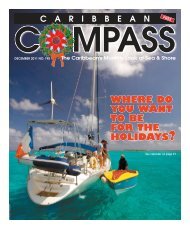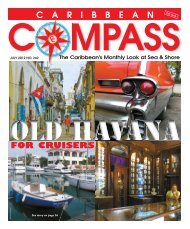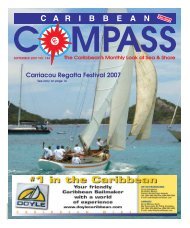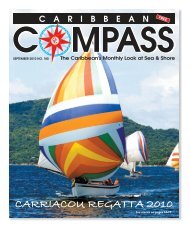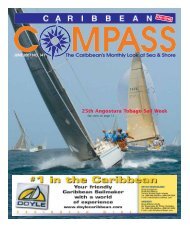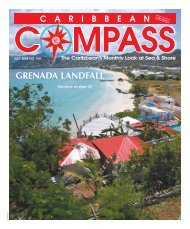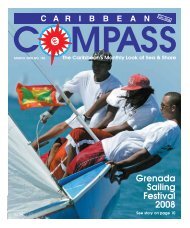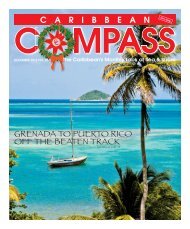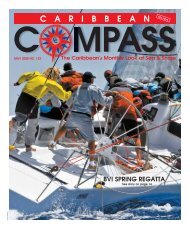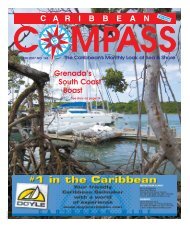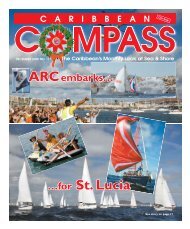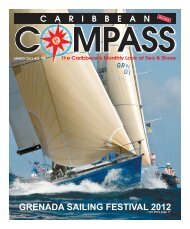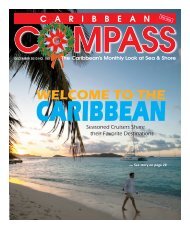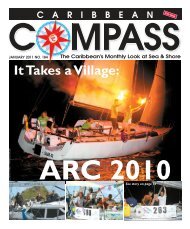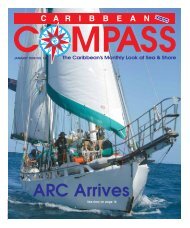Create successful ePaper yourself
Turn your PDF publications into a flip-book with our unique Google optimized e-Paper software.
NARROW ESCAPE<br />
AT CABO SAN<br />
FRANCISCO, 2008<br />
by Angelika Gruener<br />
Picking up the new <strong>Compass</strong>, which stories are you reading first? Most readers are<br />
looking for the “What-happened-to-others-articles” to get thrilled. But if piracy has<br />
never happened to you, you can’t imagine how it is, to be part of the scene, to be<br />
traumatized for months.<br />
One year after having a confrontation with pirates, we are able to talk about it. We<br />
feel lucky to survive. Pirates nowadays still have the same mentality as hundreds of<br />
years ago: they will kill to get valuables or maybe even the boat itself.<br />
During the Christmas 2007 and New Year 2008 holidays we were on our way from<br />
Puerto la Cruz, Venezuela, to Trinidad, motoring along the north coast of the Paria<br />
Peninsula at night in the low-wind periods. During the day, we stopped at several<br />
places described in Chris Doyle’s Cruising Guide to Venezuela. When we anchored<br />
in Puerto Santos, some youngsters came out to us, and we gave them our copy of<br />
the October 2007 issue of <strong>Compass</strong>, which included the article “Cruising the<br />
Northeast Coast of Venezuela” by Elaine Conklin with a photo of a fisherman from<br />
Puerto Santos. Elaine’s article described how friendly people of that village are. They<br />
really were!<br />
Our last hop along the Paria Peninsula was 70 nautical miles from Puerto Santos<br />
to Cabo San Francisco, an uninhabited bay we had visited several times before. It is<br />
marvelous there, with freshwater rivers, countless flowers, and high mountains. We<br />
went ashore, fetched water, did the laundry, and soaked in freshwater pools — in all,<br />
having a nice morning.<br />
It was 3:00PM on January 2nd, 2008, when suddenly a pirogue approached from<br />
the east around the cape with five strong young men aboard. I went below to dress<br />
properly. Our 20-something son put on his military shirt. The pirogue came close<br />
very fast. “Hello my friend!” one man shouted in perfect English. Unfortunately, this<br />
phrase often means trouble.<br />
Immediately the boat was along our port side. Aboard were one black and four<br />
light brown men aged from about 23 to 30, their clothes absolutely clean, down to<br />
white sport shoes. Usually the pirogues are planked only on the outside of the<br />
wooden stringers, with the inside left free to facilitate bailing out bloody water from<br />
fishing. This pirogue was, however, additionally planked on the inside for extra<br />
strength, so that the full load of the two 75-horsepower Yamaha Enduros could be<br />
used in heavy seas. The name “SHADOW” was written in black block letters on the<br />
side of the white hull. Inside the boat were packages, apparently wrapped watertight,<br />
in blue netting. The packages looked similar to those in a picture published in<br />
the December 2007 <strong>Compass</strong>’s article about a sinking drug-smuggling boat. They<br />
looked as if they had been pulled out of the water. Four men were standing; one sat<br />
in the stern and operated the outboards.<br />
The first sentence was, “We need water,” reminding me of an incident that happened<br />
about three years before, when an Italian skipper with two friends sailed his<br />
catamaran toward Los Testigos. About 50 nautical miles out of Testigos, a boat with<br />
five men, camouflaged in military uniforms, stopped them, asking for water. When<br />
the skipper turned to go into the cabin to get water he was shot in the back.<br />
Back to us. My husband gave the five men a five-litre container of water, which<br />
was standing handy on deck. It was thrown carelessly into the pirogue. Thirty metres<br />
away, a freshwater river poured into the sea. After some discussion, the men wanted<br />
to sell us marijuana. We declined. Next they offered cocaine, which we didn’t want<br />
either. During the conversation, the men showed lots of nervousness and their<br />
pirogue repeatedly banged onto our yacht’s port side. When I told them to hold their<br />
pirogue off, they became very agitated. “Money, money,” one guy then shouted.<br />
“What for?” I asked. There was a short discussion among the five. It became clear<br />
that they intended to board the boat and rob us.<br />
My husband, son and I had discussed what to do in case of piracy, so we were well<br />
prepared and shoved the pirogue off before the men could come on board. They<br />
immediately got angry. Two of them pulled out pistols from under their trousers: a<br />
9mm Beretta and a Smith & Wesson Kal 40. In that moment I could have had time<br />
to shoot them with our shotgun. But Customs in Martinique had confiscated it a<br />
year ago. All this went through my head in a fraction of a second.<br />
When the man in the bow loaded his pistol, I jumped down the companionway to<br />
make room for our son and my husband. The first shot was fired. Next, the black<br />
pirate aimed and shot directly at my husband, who ducked at the right time, grabbed<br />
the loaded flare gun, aimed, and shot just above the bandits’ heads. The detonation<br />
of the four-calibre flare gun was incredible. The ricochet of the explosion from the<br />
high mountains made the shots from the pirate’s 9mm seem like toys.<br />
The gangster at the engines accelerated; more shots were fired towards us. Our son<br />
reloaded the flare gun, and my husband shot after them again. By now they were<br />
fleeing with full power in the direction they had come from — to the east.<br />
They left us with several hits; they shot at least four times through the cockpit,<br />
missing my husband and our son only by centimetres. The toughened glass in the<br />
doghouse was shot through and they tried to shoot holes into the hull below the<br />
waterline. Fortunately, our vessel is made of steel.<br />
You won’t believe how fast we heaved anchor and headed far out to sea, seeking<br />
the roughest waves where the bandits would have less chance to hit us.<br />
We were totally exhausted when we arrived in Trinidad, where we expected to find<br />
sanctuary, but met exactly the opposite. We were “greeted” by a whole army of coastguard<br />
and police, well armed and in bulletproof vests. Once ashore, we were not<br />
allowed to go onto our boat or to touch anything, not even the lifeline, even to fend<br />
off our boat that was banging onto the dock. Five divers searched our boat from the<br />
outside (but left all the barnacles on). For six hours, three officials (in my presence)<br />
turned everything inside our boat upside down, leaving an incredible mess, while my<br />
husband and our son stood up in the blazing sun on the jetty guarded by machine<br />
guns. Of course we had absolutely no drugs on board — only eight jars of 15-year-old<br />
New Zealand honey the importation of which is prohibited, and ten bottles of rum<br />
and wine. A receipt for the confiscation was strictly refused. What a disappointing<br />
reception for a traumatized sailing family!<br />
Everybody should think about what to do in case of piracy. If you encounter<br />
pirates, don’t think of getting any help. You are alone with the situation. Even if you<br />
have contact on the radio or phone, the coastguard can only act in its own waters.<br />
Therefore Customs should allow skippers to have rifles for self-defence. In certain<br />
islands, firearms have to be surrendered to the police. Our seven-shot pump gun<br />
was confiscated in Martinique with the end result of protecting those pirates. So, we<br />
left those five men to attack somebody else! Only when there are no pirates, will we<br />
not need guns.<br />
Cruisers must be informed of what is going on. Please, take your time and look in<br />
the <strong>Caribbean</strong> Safety and Security Net’s website, www.safetyandsecuritynet.com, at<br />
“Island reports” — e.g. “Venezuelan islands”, or others — for reference.<br />
Like Dave Jones’ boat<br />
(see story on previous<br />
page), Angelika’s also<br />
received bullets<br />
through the doghouse<br />
windows while cruising<br />
along the<br />
Peninsula of Paria<br />
MAY <strong>2009</strong> CARIBBEAN COMPASS PAGE 27



